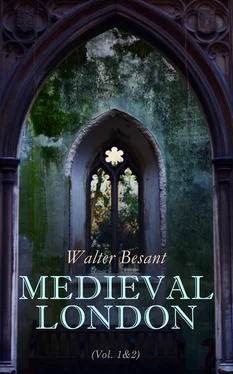In the years 1314 and 1315 there was a dearth, and many died of hunger. “There followed this famine”—Stow’s Chronicle—“a grievous mortalitie of people, so that the quicke might unneath bury the dead. The Beastes and Cattell also by the corrupt Grasse whereof they fedde, dyed, whereby it came to passe that the eating of flesh was suspected of all men, for flesh of Beastes not corrupted was hard to finde. Horseflesh was counted great delicates; the poore stole fatte Dogges to eate; some (as it was sayde) compelled through famine, in hidde places, did eate the fleshe of their owne children, some stole others which they devoured. Thieves that were in prisons, did plucke in peeces those that were newly brought amongst them and greedily devoured them half alive.” In 1315 there was also a storm which damaged Holborn Bridge and Fleet Bridge.
In the years 1316, 1317, and 1318, under the Mayoralty of John de Wengrave, Recorder and Coroner of the City and Alderman of Chepe, there were dissensions in the City.
The French Chronicle lays the blame upon the Mayor, who, he says, “did much evil in his time to the Commons.” They were drawing up for submission to the King certain Articles for the more regular Government of the City. As John de Wengrave owed his third election to the King it was not unreasonable to suppose that he was acting in the interest of the King rather than that of the citizens. However, the articles were confirmed by the King, who got £1000 in return. The Charter touches on a great many points, most of them fruitful in quarrels and disturbances. The analysis of the Charter given in the Liber Albus is as follows:—
“That the Mayor and Sheriffs of London shall be chosen by the citizens of that City according to the tenor of their Charters, and in no other manner.
That the Mayor of the said City shall not remain in office as such Mayor beyond one year at a time.
Also, that no Sheriff of the City shall have more than two clerks and two serjeants by reason of his office, and those, persons for whom he shall be willing to answer.
Also, that the Mayor of the said City, so long as he shall be Mayor, shall hold no other office pertaining unto that City than such office of Mayor.
Also, that the Mayor shall not demand to have brought before him, or hold, any plea that belongs to the Sheriff’s Court.
Also, that the Aldermen of that City shall be removable yearly, and be removed, on the day of Saint Gregory (12th March), and in the year following shall not be re-elected, but others (shall be elected) in their stead, etc.
Also, that the tallages, after being assessed by the men of the Wards thereunto deputed, shall not be augmented or increased by the Mayor and Aldermen, except with the common consent of the Mayor and commonalty.
Also, that the monies arising from such tallages shall be in the keeping of four reputable men, commoners of the said City.
Also, that no stranger shall be admitted to the freedom of the said City, except at the Hustings.
Also, that an inhabitant, and especially an Englishman by birth, a trader of a certain mystery or craft, shall not be admitted to the freedom of the City aforesaid except upon the security of six reputable men, of such certain mystery or craft, etc.
Also, that enquiry shall be made each year, if any persons enjoying the freedom of the City have traded with the property of others who are not of the freedom, avowing that such goods are their own. And those who shall be lawfully convicted thereof, shall lose the freedom.
Also, that all who wish to enjoy the freedom of the City shall be in Lot and Scot, and partakers of all burdens for (maintaining) the state of the City, etc.
Also, that all persons of the freedom of the City, and dwelling without the said City, who by themselves and their servants follow a trade within the City, shall be in Lot and Scot with the commoners of the same City, etc., or shall be removed from the freedom thereof.
Also, that the Common Seal shall be in the keeping of two Aldermen and two commoners, by the commonalty to be chosen, and that the same shall not be denied to poor or to rich.
Also, that the giving of judgment in the Courts of the City, after verdict (given), shall not be deferred, unless some difficulty intervene. And if such difficulty shall intervene, such verdicts shall not stand over beyond the third Court.
Also, that the weights and beams for weighing merchandize as between merchant and merchant, the issues of which belong to the commonalty, shall be in the keeping of reputable men, by the commonalty to be chosen.
Also, that the Sheriffs may entrust the charge of collecting toll and other customs into their ferm pertaining, as also other public duties unto themselves belonging, to sufficient men for whom they shall be willing to answer.
Also, that merchants who are not of the freedom, etc., shall not sell wines or other wares by retail within the said City.
Also, that in future there shall be no brokers of any merchandize in the said City, but those who have been chosen thereto by the traders of their mysteries; and that they shall be sworn before the Mayor.
Also, that common hostelers, although they may not be of the freedom of the same City, shall be partakers of all (burdens) unto the said City pertaining, etc. Saving always, that the merchants of Gascoigne and other strangers may dwell and keep hostels for each other in the said City, in such manner as they have heretofore been wont to do.
Also, that the keeping of the Bridge shall be entrusted unto two reputable men of the City aforesaid, other than the Aldermen thereof.
Also, that no Serjeant of the Chamber at the Guildhall shall take a fee of the commonalty, etc., or do execution, unless he be one elected by the commonalty thereto.
Also, that the Chamberlain, Common Clerk (and) Common Serjeant of the City, shall be chosen and removed by the commonalty, at the will of the same commonalty.
Also, that the Mayor, Recorder, and the Chamberlain and Common Clerk aforesaid, shall be content with their fees, from of old appointed and paid.
Also, that the property of the Aldermen of the said City shall be taxed in aids, tallages, and contributions, by the men of the Wards in which such Aldermen shall be residing, in the same manner as the property of the other citizens of the same Wards.
Also, that the Aldermen and commonalty, for the necessities and advantage of the said City, may among themselves assess and levy tallages upon their property within the said City, rents as well as other things.” (Riley’s Trans. pp. 127-129.)
According to this Charter the only way to the civic franchise was by becoming a member of the civic guilds: “That no inhabitant, of any mystery or trade, be admitted into the freedom of the City, unless by surety of six honest and sufficient men of the mystery or trade that he shall be of”—a fact which proves the importance of the guilds. “At this time,” says the French Chronicle, “many of the people of the trades of London were arrayed in Livery and a good time was about to begin.” But few of the trades were as yet incorporated.
The history of this unhappy reign, as concerns the City, is much occupied with charges, claims, and attacks upon the rights of the citizens of London. In these, the King was advised or led, by men who understood how to evade and to ignore the law. Edward II., like his predecessor Henry III., and his successor Richard II., was always in want of money and never without advisers to show him how to extort money from the City, whose wealth they believed to be inexhaustible. Among the last of these attempts was one made in the year 1321 by means of an Iter. The business is passed over by Maitland, Holinshed, and by the French Chronicle. Its history is related by R. R. Sharpe (London and the Kingdom). He says:
Читать дальше












